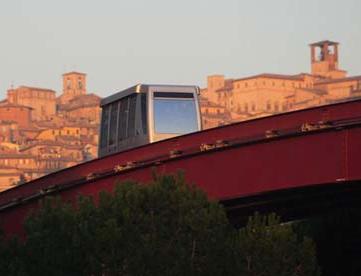The Null Device
2008/5/28
Paul "Hackers and Painters" Graham has an interesting essay on the implicit messages that cities send to their inhabitants:
Great cities attract ambitious people. You can sense it when you walk around one. In a hundred subtle ways, the city sends you a message: you could do more; you should try harder.
The surprising thing is how different these messages can be. New York tells you, above all: you should make more money. There are other messages too, of course. You should be hipper. You should be better looking. But the clearest message is that you should be richer.
What I like about Boston (or rather Cambridge) is that the message there is: you should be smarter. You really should get around to reading all those books you've been meaning to.
How much does it matter what message a city sends? Empirically, the answer seems to be: a lot. You might think that if you had enough strength of mind to do great things, you'd be able to transcend your environment. Where you live should make at most a couple percent difference. But if you look at the historical evidence, it seems to matter more than that. Most people who did great things were clumped together in a few places where that sort of thing was done at the time.Graham lists the messages sent by other cities: while New York is about money and Cambridge, Massachusetts, is about knowledge, Silicon Valley is all about power, Berkeley is about being civilised and living better, while Washington DC and Los Angeles are about whom you know, although in different ways. Internationally, Oxford and Cambridge (the original one) are intellectual, though not as strongly as Cambridge, MA. Paris is about style (people care about art there, though it's not an intellectual centre). Meanwhile, London is residually about being more aristocratic (at least, when viewed from an American viewpoint), though also places a value on "hipness", and keeping abreast of trends.
He also speculates that this effect, by which a city accumulates a set of values and, in its outlook, encourages certain motivations (whilst implicitly discouraging ones at odds with them), was behind historical phenomena such as mediæval Florence being home to a disproportionate number of artists compared to other, equally big, cities.
You can see how powerful cities are from something I wrote about earlier: the case of the Milanese Leonardo. Practically every fifteenth century Italian painter you've heard of was from Florence, even though Milan was just as big. People in Florence weren't genetically different, so you have to assume there was someone born in Milan with as much natural ability as Leonardo. What happened to him?
If even someone with the same natural ability as Leonardo couldn't beat the force of environment, do you suppose you can?The power of the invisible cultural environment, as manifested in a myriad tiny things, to nurture or thwart ambitions is powerful:
No matter how determined you are, it's hard not to be influenced by the people around you. It's not so much that you do whatever a city expects of you, but that you get discouraged when no one around you cares about the same things you do
There's an imbalance between encouragement and discouragement like that between gaining and losing money. Most people overvalue negative amounts of money: they'll work much harder to avoid losing a dollar than to gain one. Similarly, though there are plenty of people strong enough to resist doing something just because that's what one is supposed to do where they happen to be, there are few strong enough to keep working on something no one around them cares about.
Because ambitions are to some extent incompatible and admiration is a zero-sum game, each city tends to focus on one type of ambition. The reason Cambridge is the intellectual capital is not just that there's a concentration of smart people there, but that there's nothing else people there care about more. Professors in New York and the Bay area are second class citizens—till they start hedge funds or startups respectively.
At the moment, San Francisco's message seems to be the same as Berkeley's: you should live better. But this will change if enough startups choose SF over the Valley. During the Bubble that was a predictor of failure—a self-indulgent choice, like buying expensive office furniture. Even now I'm suspicious when startups choose SF. But if enough good ones do, it stops being a self-indulgent choice, because the center of gravity of Silicon Valley will shift there.Speaking as one who has moved from Melbourne to London, this rings true. Melbourne seems more about creativity and collaborative expression, whereas London is more about status and success. In Melbourne, people get involved in creative projects that don't have a career or strategy for success attached to them, be it making zines, playing music or other arts. In London, it's more about success; all the artists want to be Damien Hirst or Tracey Emin (or, indeed, Banksy) and all the indie bands have stylists and want to be on the cover of NME. (All of this reflects itself in the nature of art produced here; the calculatedly stylised nature of it, falling in a spectrum between naked commercialism and (equally mercantile) fashion-driven hipness.) People pay more attention to keeping score here, and that affects the way the game is played. If you tinker around on creative projects with no commercial potential, you may as well be building model train sets in your shed, or, indeed, playing World Of Warcraft. (In fact, if you did the latter, you'd probably have more of an impact on the world.) People humour you, but nobody's interested in that any more than they are in what you had for lunch. I don't know whether this was always the case in the capital, or whether it was a result of Thatcherite/Blairite entrepreneurial values being adopted by the broader population, though it is a noticeable phenomenon.
The mediæval Italian hilltop town of Perugia has inaugurated a new, incongruously futuristic, transport system:
 a light railway of pilotless, podlike cars, running from the valley to the centre of the old town:
a light railway of pilotless, podlike cars, running from the valley to the centre of the old town:
Dubbed the "Mini Metro", the rail line, which starts from the valley floor, climbs for 3km, wiggles around ancient constructions and monuments, and drops visitors off in the historic centre where an unobstructed view of Assisi and the rolling countryside gleams in the distance. Total travel time? 11 minutes.
At first look, the sight of pilot-less metallic pods shuttling people up and down the hillside on an elevated track seems, to put it mildly, anachronistic. Call it Tron-meets-Dante in the Umbrian hills.If the Mini Metro is successful, the Perugian municipal authorities plan to ban cars from the old town's narrow streets altogether.
They're now making a sequel to early-1980s hacker film Wargames. The Russkies have, predictably, been replaced with Middle Eastern terrorists, though the plausibility doesn't seem to have improved much:
In this updated version, WOPR (the uppity NORAD supercomputer) is replaced by Ripley (a sexy artificial intelligence that tempts terrorists out of the woodwork -- while defending Newt in her downtime). When the 21st-century equivalent to Matthew Broderick (Matt Lanter) ticks Ripley off, she decides to hijack a Predator drone armed with nukes (I knew they were around somewhere). The race is on to stop Ripley or see American cities wiped from the map.
